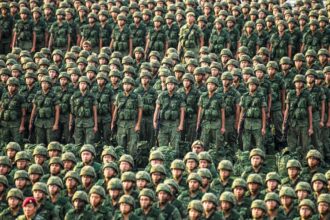Executive Outcomes, a private military company founded in the early 1990s, emerged as a significant player in the realm of conflict resolution and military intervention during a tumultuous period in Africa.
The organization was characterized by its unique approach to warfare, which combined military expertise with corporate strategies, allowing it to operate in environments where traditional military forces were either unwilling or unable to intervene.
This article delves into the multifaceted role of Executive Outcomes in two critical case studies: Angola and Sierra Leone, examining the context, impact, controversies, and legacy of its interventions. The rise of private military companies like Executive Outcomes reflects a broader trend in modern warfare, where state actors increasingly rely on non-state entities to fulfill military objectives. This shift raises important questions about sovereignty, accountability, and the ethical implications of privatizing military force.
As Executive Outcomes navigated the complexities of civil wars and insurgencies, its actions sparked debates about the effectiveness and morality of using mercenaries in conflict zones. The following sections will explore the company’s involvement in Angola and Sierra Leone, providing insights into its operational strategies and the consequences of its interventions.
Key Takeaways
- Executive Outcomes played a significant role as a private military company intervening in conflicts in Angola and Sierra Leone.
- Their interventions had notable impacts on the course of both civil wars, contributing to military successes.
- The company faced controversies and criticisms related to legality, ethics, and the privatization of military force.
- Comparisons reveal differences and similarities in their operations and outcomes in Angola versus Sierra Leone.
- The legacy of Executive Outcomes offers important lessons on the use of private military firms in conflict resolution.
Executive Outcomes in Angola: Background and Context
Angola’s civil war, which erupted shortly after the country gained independence from Portugal in 1975, created a chaotic environment marked by violence and instability. The conflict primarily pitted the Popular Movement for the Liberation of Angola (MPLA) against the National Union for the Total Independence of Angola (UNITA), leading to widespread suffering among civilians and significant economic decline. By the early 1990s, as the war dragged on for nearly two decades, both sides were exhausted, and international attention began to focus on finding a resolution to the conflict.
In 1993, Executive Outcomes was contracted by the Angolan government to assist in combating UNITA’s insurgency. The company brought with it a cadre of highly trained soldiers and advanced military equipment, including aircraft and armored vehicles.
This infusion of resources was crucial for the Angolan government, which struggled to maintain control over vast territories plagued by UNITA’s guerrilla tactics. The partnership between Executive Outcomes and the Angolan government marked a significant turning point in the civil war, as it provided a much-needed boost to government forces that had been faltering under pressure.
Executive Outcomes in Angola: Intervention and Impact

The intervention of Executive Outcomes in Angola had immediate and profound effects on the dynamics of the civil war. The company’s forces engaged in several key operations that successfully targeted UNITA strongholds, disrupting their supply lines and diminishing their operational capabilities. One notable operation involved a series of airstrikes and ground assaults that led to the recapture of strategic towns previously held by UNITThis military success not only bolstered the morale of government troops but also shifted the balance of power in favor of the MPLA.
Moreover, Executive Outcomes’ involvement extended beyond mere combat operations. The company also played a role in training Angolan soldiers, enhancing their combat effectiveness and operational readiness. This capacity-building aspect of their intervention contributed to a more sustainable military force for the Angolan government, allowing it to maintain control over territories previously contested by UNITAs a result, by the mid-1990s, Executive Outcomes had significantly altered the trajectory of the civil war, paving the way for eventual peace negotiations.
Executive Outcomes in Angola: Controversies and Criticisms
| Aspect | Details | Controversies / Criticisms |
|---|---|---|
| Company Name | Executive Outcomes (EO) | Private military company operating in Angola during the 1990s |
| Operational Period in Angola | 1993 – 1995 | Short but impactful intervention in Angolan civil war |
| Primary Role | Military support to Angolan government against UNITA rebels | Accused of blurring lines between mercenary activity and legitimate military support |
| Key Achievements | Significant military victories against UNITA, restoration of government control over key areas | Success overshadowed by allegations of human rights abuses and excessive force |
| Funding Sources | Angolan government, reportedly linked to diamond trade revenues | Criticized for involvement in resource exploitation and conflict financing |
| Human Rights Record | Reports of civilian casualties and harsh tactics | International human rights organizations condemned EO’s methods |
| Legal Status | Operated in a legal grey area; no formal international regulation of PMCs at the time | Raised questions about accountability and legality of private military forces |
| Impact on Angola | Temporary stabilization of government control, but long-term peace remained elusive | Critics argue EO’s involvement prolonged conflict by militarizing the situation |
| International Response | Mixed reactions; some governments tacitly supported, others condemned | Debate over legitimacy and ethics of private military companies intensified |
Despite its military successes, Executive Outcomes’ intervention in Angola was not without controversy. Critics raised ethical concerns regarding the use of mercenaries in a civil conflict, arguing that such practices undermined national sovereignty and set a dangerous precedent for future interventions. The presence of a private military company operating alongside government forces blurred the lines between state authority and corporate interests, leading to questions about accountability for human rights violations.
Additionally, allegations surfaced regarding Executive Outcomes’ involvement in human rights abuses during its operations in Angola. Reports indicated that some military actions resulted in civilian casualties and destruction of property, raising alarms among human rights organizations. These incidents fueled criticism from various quarters, including international observers who argued that mercenary forces lacked the oversight typically associated with national militaries.
The duality of Executive Outcomes’ role as both a protector of state interests and a potential perpetrator of violence created a complex narrative that continues to be debated today.
Executive Outcomes in Sierra Leone: Background and Context
The situation in Sierra Leone during the late 1990s presented another opportunity for Executive Outcomes to assert its influence. The country was embroiled in a brutal civil war that began in 1991, characterized by widespread atrocities committed by rebel groups such as the Revolutionary United Front (RUF). The conflict was marked by horrific acts of violence against civilians, including mass killings, amputations, and sexual violence.
As international efforts to mediate peace faltered, Sierra Leone descended further into chaos. In 1995, facing an escalating crisis and an ineffective national army, the Sierra Leonean government sought assistance from Executive Outcomes. The company was contracted to help restore order and combat the RUF’s insurgency.
Similar to its approach in Angola, Executive Outcomes deployed highly trained personnel equipped with advanced weaponry to bolster government forces. This intervention was seen as a last resort for a government struggling to maintain control amidst rampant violence.
Executive Outcomes in Sierra Leone: Intervention and Impact

The impact of Executive Outcomes’ intervention in Sierra Leone was swift and significant. Within months of their deployment, the company launched a series of successful military operations against RUF positions, reclaiming territory that had been lost to rebel forces. Their tactical expertise and superior firepower allowed them to engage effectively with insurgents, leading to notable victories that shifted momentum back toward the government.
Beyond immediate military successes, Executive Outcomes also contributed to stabilizing key regions within Sierra Leone. By providing training and support to local forces, they helped enhance the capabilities of the national army, enabling it to take on greater responsibility for security operations. This capacity-building effort was crucial for establishing a more resilient military structure capable of maintaining peace after Executive Outcomes’ withdrawal.
Executive Outcomes in Sierra Leone: Controversies and Criticisms
However, like its operations in Angola, Executive Outcomes’ involvement in Sierra Leone was not without its share of controversies. Critics argued that relying on private military companies for conflict resolution raised serious ethical questions about accountability and governance. The presence of mercenaries operating alongside national forces blurred lines between legitimate military action and profit-driven motives.
Furthermore, allegations emerged regarding human rights abuses during Executive Outcomes’ operations in Sierra Leone. Reports indicated instances where civilians were caught in crossfire or subjected to violence during military engagements. These incidents drew condemnation from human rights organizations and sparked debates about the moral implications of employing private military contractors in situations where civilian lives were at stake.
Comparison of Executive Outcomes’ Interventions in Angola and Sierra Leone
When comparing Executive Outcomes’ interventions in Angola and Sierra Leone, several similarities and differences emerge. In both cases, the company was contracted by beleaguered governments seeking assistance against insurgent groups that posed existential threats. Their operational strategies involved direct military engagement combined with training local forces to enhance overall combat effectiveness.
However, there were notable differences in context and outcomes between the two interventions. In Angola, Executive Outcomes played a pivotal role in shifting the balance of power toward the MPLA government during a prolonged civil war that ultimately led to peace negotiations. Conversely, while their intervention in Sierra Leone yielded immediate military successes, it did not result in a lasting resolution to the underlying issues driving conflict within the country.
Legacy of Executive Outcomes’ Interventions in Angola and Sierra Leone
The legacy of Executive Outcomes’ interventions is complex and multifaceted. In Angola, their involvement is often viewed as a catalyst for change that contributed to ending a protracted civil war. The company’s ability to provide rapid military support helped stabilize a nation on the brink of collapse and facilitated peace negotiations that eventually led to a formal settlement.
In Sierra Leone, however, while Executive Outcomes achieved tactical victories against rebel forces, their legacy is marred by ongoing challenges related to governance and security. The reliance on private military contractors raised questions about state sovereignty and accountability that continue to resonate within discussions about modern warfare.
Lessons Learned from Executive Outcomes’ Interventions
The experiences garnered from Executive Outcomes’ interventions offer valuable lessons for future conflict resolution efforts. One key takeaway is the importance of balancing military intervention with long-term strategies for peacebuilding and governance reform. While immediate military successes can provide temporary relief from violence, sustainable solutions require addressing underlying political grievances and fostering inclusive governance structures.
Additionally, these case studies highlight the need for clear accountability mechanisms when engaging private military companies in conflict zones. Establishing robust oversight frameworks can help mitigate risks associated with human rights abuses while ensuring that interventions align with international humanitarian standards.
Executive Outcomes’ Impact on Conflict Resolution in Angola and Sierra Leone
In conclusion, Executive Outcomes played a significant role in shaping conflict dynamics in both Angola and Sierra Leone through its military interventions during critical periods of instability. While their actions led to immediate tactical successes that bolstered government forces against insurgent threats, they also raised important ethical questions regarding accountability and governance within conflict resolution frameworks. As discussions surrounding private military companies continue to evolve, reflecting on Executive Outcomes’ legacy provides essential insights into navigating complex conflicts while prioritizing human rights and sustainable peacebuilding efforts.
Ultimately, understanding these interventions can inform future approaches to conflict resolution that seek not only to address immediate security concerns but also foster long-term stability and justice within affected societies.
Executive Outcomes played a significant role in the conflicts in Angola and Sierra Leone, providing military assistance that shaped the outcomes of these civil wars. For a deeper understanding of the implications of private military companies in such conflicts, you can read more in the article available at




